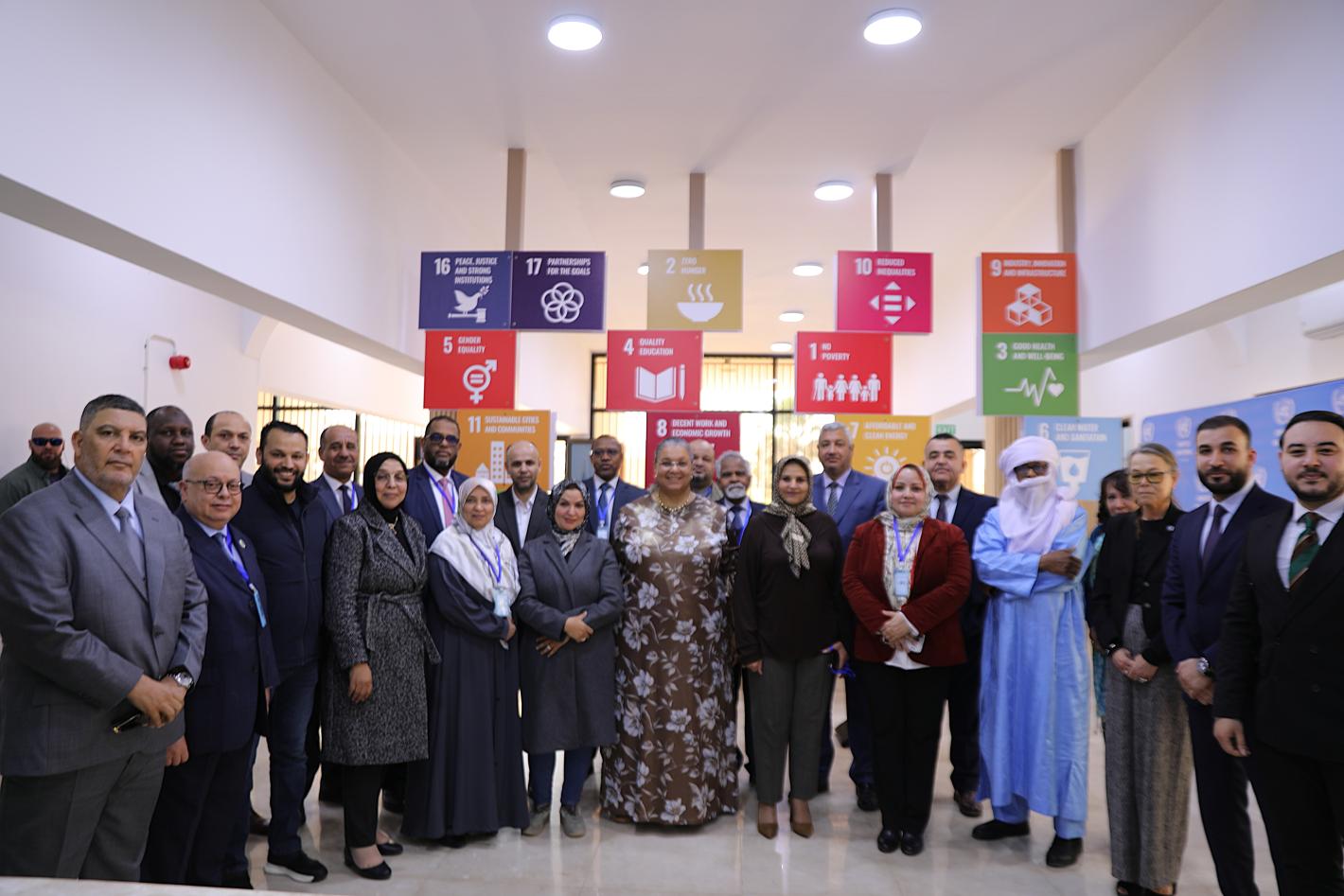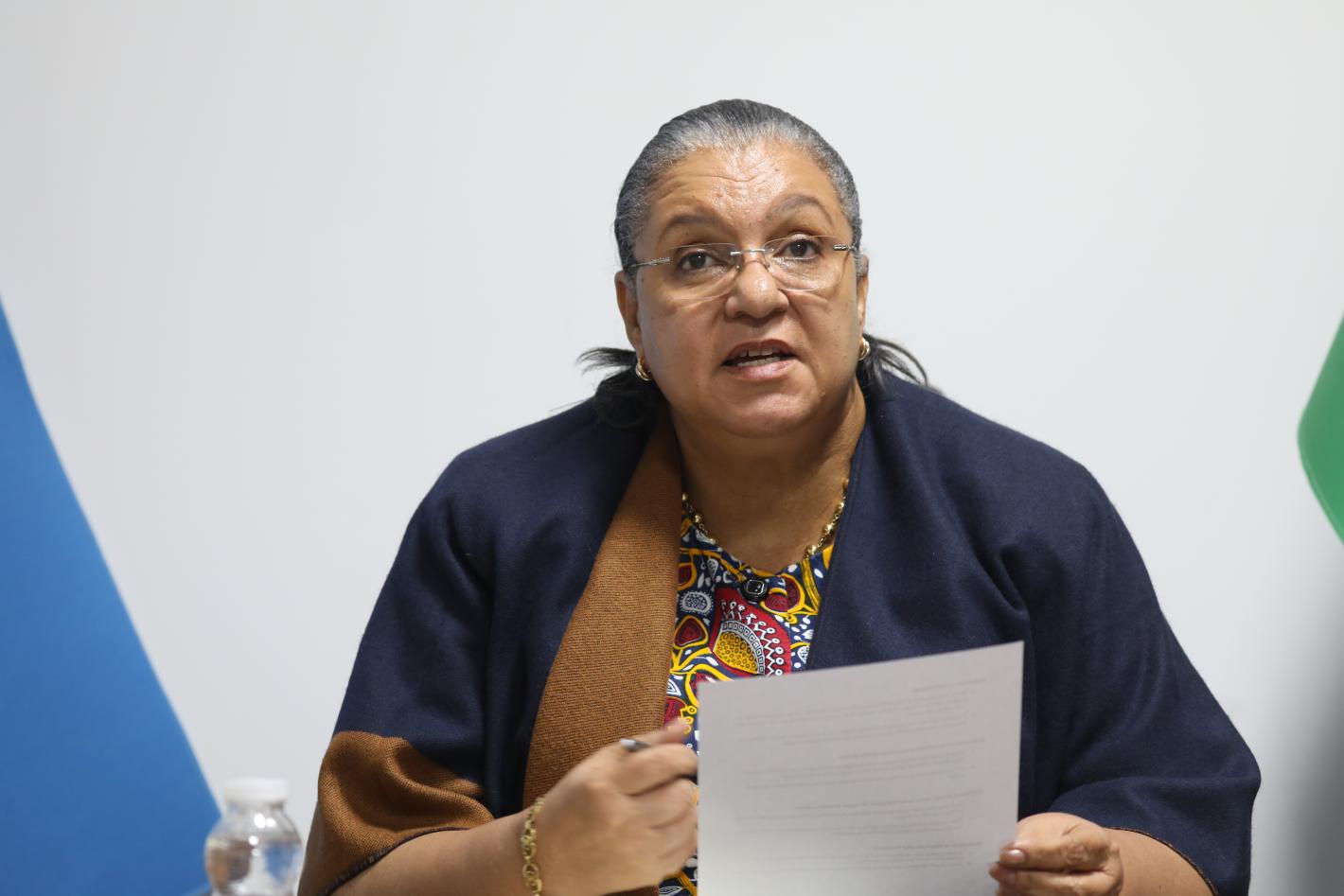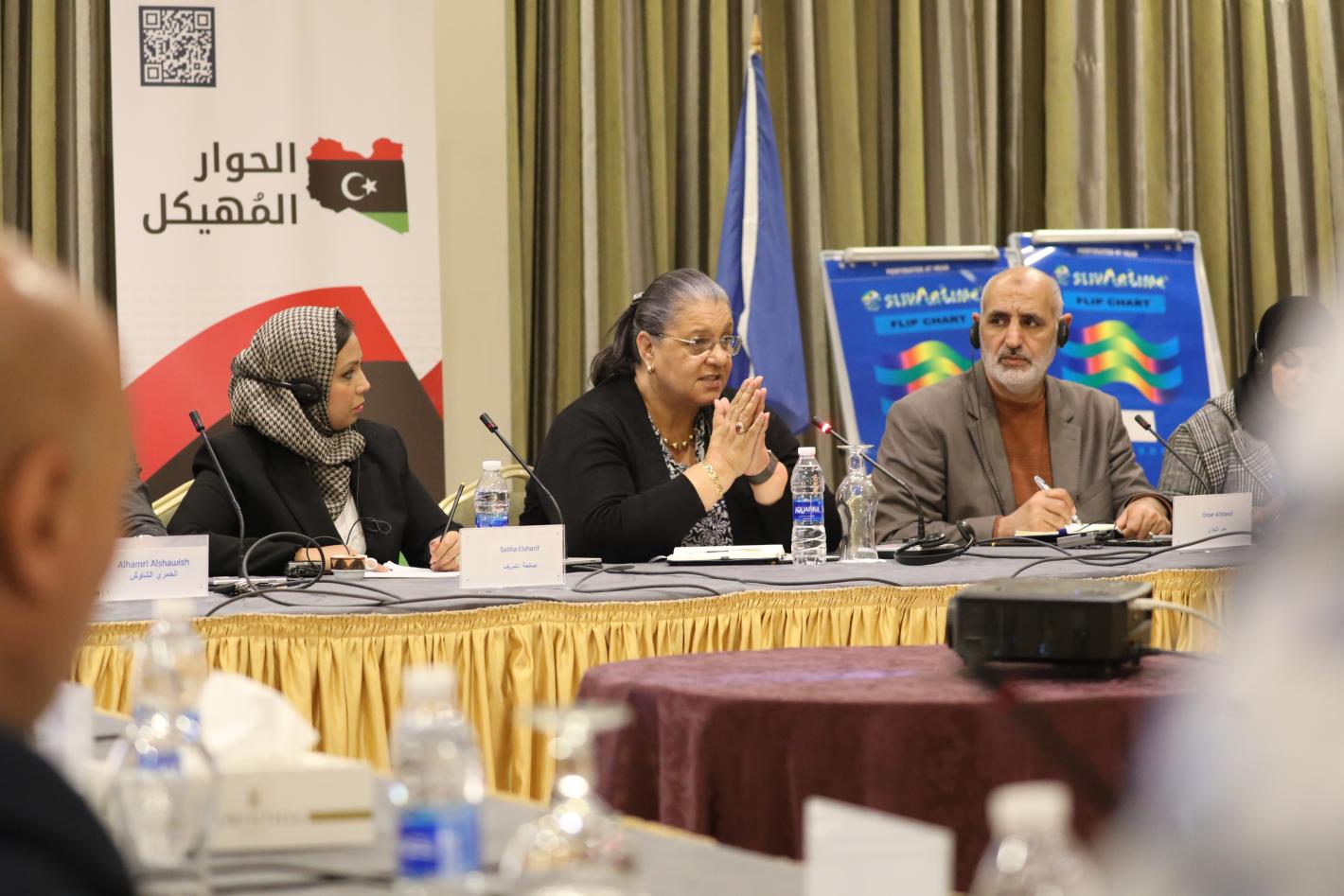Mr. President (Ambassador Abdou Abarry of Niger), Excellencies,
Allow me to congratulate Niger for assuming the presidency of the Security Council during the month of September and for giving me the opportunity to brief this Council today.
It is becoming a regrettable cliché to appear before you and warn that Libya is at a critical juncture but yet I am compelled to pronounce these same words again today. Libya is indeed at a decisive turning point. Your support, not only in words but most importantly in action, will help determine whether the country descends into new depths of fragmentation and chaos, or progresses towards a more prosperous future.
Mr. President, Excellencies,
On the ground, an uneasy stand-off continues around Sirte, imperiling the lives of the city’s 130,000 vulnerable inhabitants as well as the country’s vital oil infrastructure which comprises its economic lifeline. While the frontlines have remained relatively quiet since June, both the Libyan Arab Armed Forces (LAAF) and forces under the control of the Government of National Accord (GNA) continue to benefit from the regrettable assistance of foreign sponsors to stockpile advanced weaponry and equipment.
Since the Secretary-General last briefed you on 8 July, some 70 resupply flights landed in eastern airports in support of the LAAF while 30 resupply flights were dispatched to airports in western Libya in support of the GNA. Similarly, around nine cargo vessels docked in western ports in support of the GNA, while a reported three cargo vessels arrived in support of the LAAF. Foreign sponsors are fortifying their assets at key Libyan air bases in the east and west. The activity described above constitutes an alarming breach of Libya’s sovereignty, a blatant violation of the UN arms embargo, not to mention the commitments undertaken by the Berlin conference participants. The Mission continues to receive reports of large-scale presence of foreign mercenaries and operatives, further complicating local dynamics and chances of a future settlement.
While the rate of incidents and accidents has decreased from booby traps, including IEDs, landmines and explosive remnants of war, explosive hazard contamination remains a significant risk to many communities, particularly in southern Tripoli. As of 24 August, a total of 61 people have been killed and 113 people injured, of which 107 are civilians. The UN continues to support the authorities to develop and implement strategies to ensure the safe, dignified, and voluntary returns of people to their homes.
Reports of imminent offensives, and reliance on social media networks to spread those rumors, exacerbate the risk of miscalculation. As a sign of increased volatility, localised tensions among armed groups, most recently in the cities of al-Asabaa, Sirte and neighboring localities, are on the rise with allegations of unlawful arrests and detention, abuse of power and targeting of civilians being widely shared with the Mission. These developments make the requirement for a genuine DDR programme even more urgent. On 26 August at night, General Haftar's forces launched Grad rockets towards areas in which GNA forces were operating near Sirte and last night there were similar reports of rockets launched by forces affiliated with General Haftar. The rockets did not cause any damage or injuries but are a breach of the ceasefire that General Haftar's spokesperson said he signed up to in June.
With the stakes so high, any such reckless action risks igniting large-scale confrontation, with the devasting consequences this would entail for the country and the region at large. It is imperative that you use your influence to impress on all sides that now is the time for restraint.
Mr. President, Excellencies,
Instability is further compounded by degraded socio-economic conditions, fueling popular unrest and threatening the fragile calm required to advance our security and political discussions.
The partial lifting of the oil blockade announced by the LAAF on 18 August had a minimal impact on the severe energy crisis faced by the country as it only applied to the removal of condensates from eastern stores. While this allowed the National Oil Corporation to continue providing natural gas for eastern power plants, the blockade otherwise remains unreasonably in place including a forced shutdown of all domestic refineries. As the international price of fuel increases, so do domestic fuel shortages which negatively impacts on multiple sectors of the economy, including electricity. In the nation’s capital, residents too often go without electricity for up to twenty hours per day. We must make the full lifting of oil blockade, which has been in place since January, a top priority.
The immiseration of the Libyan people is further compounded by the debilitating effect of the COVID-19 pandemic, which appears to be spiraling out of control. The number of confirmed cases has more than doubled in the last two weeks, with 15,156 cases and 250 recorded deaths as at 1 September. Exponential increases are a worrying trend with community transmission now reported in some of Libya’s main cities, including Tripoli and Sebha. We are, however, looking at the problem through a keyhole, as persistent shortages in testing capabilities, adequate health care facilities and contact tracing mean that the true scale of the pandemic in Libya is likely to be much higher. Handling of the pandemic is constrained by the fragmentation of health sector institutions, the extreme shortage of medical supplies and workers as well as a funding shortage. Nearing full collapse after more than nine years of conflict, the health care system is unable to respond to the additional weight placed by COVID-19 patients along with maintaining normal health services, including child immunization programmes. The United Nations and our partners are at the forefront of supporting the national authorities, through the provision of health supplies and personal protection equipment. We are also working closely with the authorities to build capacity of health workers, to destigmatize the virus and increase awareness to ensure people take the proper precautions to protect themselves. It is essential that Libyan authorities cooperate transparently in our joint fight to control this terrible plague.
Mr. President, Excellencies,
Humanitarian access, compounded by COVID-19 restriction measures, remains a persistent challenge across the country. These challenges notwithstanding, the humanitarian organizations have reached more than 243,000 people with assistance since the beginning of the year. This includes support to 66,000 internally displaced people, 119,000 vulnerable, conflict-affected Libyans and recent returnees and 58,000 migrants and refugees.
The socioeconomic impact of COVID-19, along with the protracted crisis and the deteriorating public services, continued to stretch the coping capacities of those in the most vulnerable circumstances, particularly the more than one million people estimated to be in need of humanitarian assistance in 2020.
I remain concerned that migrants, refugees and asylum-seekers continue to attempt to cross the Mediterranean, at great risk to their lives. I am deeply saddened by the recent deaths of 45 migrants and refugees in a single incident on 18 August when their boat sank off Libya’s coast attempting to cross to Europe. More than 7,000 migrants and refugees have attempted this crossing this year; more than 300 of whom have died. Reports of delays in rescue and disembarkation highlight the need for a review of the European countries’ approach to this situation and for a more humane and predictable disembarkation mechanism in line with the responsibilities placed on Member States by international human rights law as well as search and rescue obligations. Libya cannot be considered as a safe port for disembarkation. Many migrants and refugees that have been intercepted at sea have been returned to Libya and placed into detention. As of 21 August, almost 2,400 migrants and refugees are in official detention centres in Libya, where they are subjected routinely to grave human rights violations. Many more are in unofficial sites where the UN does not have access. I continue to urge for greater steps by the authorities against smugglers and traffickers and for finding alternatives to detention in Libya.
UNSMIL welcomes the nomination by the High Commissioner for Human Rights of the three members of the independent Fact Finding Mission on Libya. We look forward to cooperating with them and assisting them in fulfilling their mission to document violations of international human rights and humanitarian law since 2016, address impunity for such violations and act as a deterrent. Sustainable peace in Libya will only be achieved through justice and accountability.
Excellencies, Mr. President,
All these elements are producing a fertile ground for social unrest across the country and confirm once more that the status-quo is simply unsustainable.
In recent days, Libyans have come out in force throughout the country, most notably in Tripoli, to express their anger over the lack of basic services, widespread water and power cuts and rampant corruption. I have personally communicated the United Nations’ concerns to Libyan authorities at reports of excessive force used against peaceful demonstrators and reiterated our calls for the rights to peaceful assembly and freedom of expression to be respected. Those who have been arbitrarily detained by armed groups must be released. The surge in the use of hate speech and incitement to violence – occasionally stirred through foreign-based media outlets and electronic armies - appears designed to further divide Libyans, to increase polarization and tear at the country's social fabric at the expense of a Libyan-Libyan solution.
On 29 August, the situation morphed into an open political crisis when the Presidency Council suspended the Minister of Interior and expedited a governmental reshuffling, exposing underlying tensions that had resurfaced within the western camp, as the threat posed by General Haftar’s offensive subsided. Now is the time to join hands as efforts are being undertaken to reach a settlement that would aim to preserve the country’s sovereignty and integrity as well as to address long-standing economic shortcomings and the need to implement lasting DDR and security sector reforms.
Mr. President, Excellencies,
The disturbing trends I have just described should all compel us to press for immediate de-escalation and return to the political process before the fragile window of opportunity created by the informal halt in hostilities dissipates to the detriment of the Libyans first and foremost, but also to the detriment of international peace and security. Glimmers of hope have appeared from within Libya, which UNSMIL, with the support of the Berlin-established International Follow-up Committee on Libya, is working on nurturing and using as an anchor to its own efforts. Rejuvenation of political activity in the West and the East has enabled the emergence of a constituency advocating for change, for a Libyan-Libyan solution, to restore the country’s sovereignty and to disentangle themselves from broader regional and international struggles.
On 21 August, President of the Presidency Council Serraj and House of Representatives’ Speaker Saleh issued simultaneous, yet separate, statements calling for an immediate ceasefire, lifting of the oil blockade and a return to the political process, under UN auspices. These statements were met by overwhelming expressions of support coming from Libyans from all political affiliations and international partners alike. I remain optimistic that, with many points of convergence between both declarations, we may have a chance to move forward with regard to intra-Libyan political and security discussions while continuing to engage with other key political and military forces across the country.
Since the last briefing, I have conducted a number of missions to shore up support for the UN’s efforts in Libya, including visits to the United Kingdom, Algeria, Morocco and Egypt. Earlier today, I met with Tunisian President Saied to specifically thank the Tunisian government for its unstinting support for the UN’s operations in Libya. With all of my regional and international interlocutors, with all of them, I secured commitments to assist UNSMIL in our task to bring the Libyan parties together and to work to maintain calm on the ground. Libya’s neighbors are directly threatened by the continuing instability and influx of weapons and mercenaries. I have also met directly with President Serraj, House of Representative Speaker Saleh and Higher State Council President Mishri as well as a number of their representatives and other key figures. I would like to thank the Swiss government for their superb facilitation of our meetings with Libyans in these difficult times. At all levels, the Mission is engaging with Libyan stakeholders to counsel calm and to build the bridges which will ease the political process.
In Ghat, on 18 August, the relatively high turn-out recorded in the municipal elections, despite COVID-19-related constraints, demonstrated the Libyans’ determination to exercise their rights to elect their representatives. It is therefore not surprising that spoilers would seek to sabotage further such exercises, as happened in the city of Traghen on 25 August when an armed group affiliated with the LAAF forced the suspension of the vote. These green shoots of democracy must be protected. I salute the tireless efforts of the Central Commission of Municipal Council Elections as it continues preparations for elections in a new group of municipalities, starting with Misrata tomorrow.
On the military front, UNSMIL continued discussions with delegations of both sides under the auspices of the 5+5 Joint Military Commission and moved past areas of convergence identified previously to adjust to new dynamics on the ground. As of today, and since 8 July, we have convened three virtual rounds of discussions with the GNA and two with the LAAF delegation in an attempt to urge for immediate de-escalation. I encouraged both sides to consider the incremental establishment of a demilitarized area starting with Sirte, supported by a comprehensive set of confidence-building measures. This proposal would also comprise a small international-Libyan joint ceasefire monitoring mechanism. While divergences of views and distrust between both sides remain high, I call on you to encourage the parties to refrain from insisting on unrealistic and maximalist positions and to participate in good faith, for the sake of their country.
Addressing the economic drivers of the conflict is at the core of any hope for a sustainable settlement. To create the necessary confidence required for a frank and open discussion over the transparent allocation of resources, UNSMIL had long pushed for an international audit of both branches of the Central Bank of Libya, as requested by Prime Minister Serraj in a letter to the Secretary General in July 2018. I am pleased to report that, thanks to your support, the international financial review audit was launched on 1 August and is moving forward quickly. This process will advance efforts to unify the two branches of the Central Bank of Libya, enhance accountability and create the transparency needed to inform discussions on the equitable management of revenue.
Mr. President, Excellencies,
I remind you that 16 months ago, we were on the cusp of a broadly gauged Libyan national conference that would have established the framework to replace the current divided political structures with one that would have more clearly reflected the legitimate aspirations of all Libyans. That effort was upended by those who falsely believed they could achieve their aims through the use of force. After 14 months of needless death and destruction, they did not succeed. The use of oil as a weapon of war has only exacerbated the misery of the Libyan people and propelled the country towards economic and social collapse. It is therefore clear that the only path out is through dialogue and compromise leading to a comprehensive political settlement and culminating in national elections.
Thank You.






